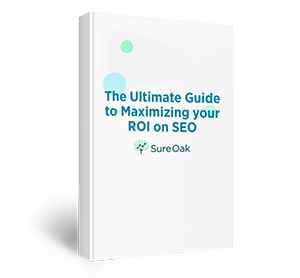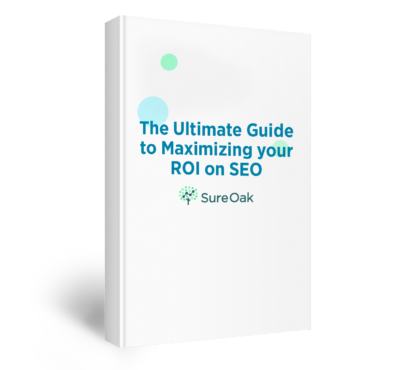The world of SEO can sometimes seem like a confusing jumble of jargon and acronyms. While they might sound alike, Domain Authority, Domain Rating, and Page Authority differ in some very big ways. Understanding the subtle differences between the three will enable you to select the right metric to assess your website’s performance. Let’s start with the Domain Authority definition.
What is Domain Authority (DA)?
Domain Authority is a ranking system that measures how well your website measures up in relation to competitor websites on search engine results pages (SERPs). Developed by Moz, an SEO software company, Domain Authority is not used by Google and should not be taken as the last word on website performance. Rather, it’s best to think of Domain Authority as a reliable proxy indicator for website ranking.
While Domain Authority can be applied to various search engines, including Bing, Yahoo, and DuckDuckGo, you should consider how well your website will rank on Google. That’s because Google accounts for the vast majority of online searches across the globe.
Moz measures Domain Authority by looking at dozens of individual factors. These include variables like domain age, website traffic volume, quality and quantity of backlinks, trustworthiness, and social media interaction.
Other SEO software providers offer similar services. For example, Semrush, a major competitor of Moz, provides a similar authority score. While the exact algorithms differ, both services look at many of the same variables.

Domain Authority is an interesting game. Since you’re never going to beat out the likes of Facebook and Youtube, you should focus on outdoing similar websites in your field. In other words, it’s important to use your website’s domain score as a comparative tool. This isn’t school; you’re not trying for a perfect score. You just need to rank higher than the competition.
One of the things that makes measuring your domain score so tricky is the fact that it can still decline over time, even if you enhance the factors that go into it. You can increase the number of quality backlinks to your website, your total traffic, and your website age, but if the competition has increased their metrics by an even greater amount, then you’ll slide down the scale.
Having a high Domain Authority doesn’t necessarily mean you’ll outrank the competition on every keyword. Internet search engines use a number of tools to determine SERP ranking. Search intent, keywords, and relevance all heavily influence any search. Rather than thinking of Domain Authority as the ultimate ranking method for a website, it’s better to view it as an indicator of your website’s overall health.
What are the Benefits of a Strong Domain Authority Score?
A strong Domain Authority score means your website will rank ahead of the competition on SERPs. In other words, if someone Googles “carpet cleaners near me” and your carpet cleaning company’s website has a stronger domain ranking than your other local competitors, you’ll appear high on the list of Google search results. Searchers are significantly more likely to click on the first link on SERPs than the second, and they’re more likely to click on the second than the third. Each spot that you rise represents a new surge of traffic.
Sales aside, ranking higher will raise your company’s profile. Websites that rank near the top of SERP for a given query are viewed as more authoritative and trustworthy than websites further down the chain. An enhanced profile will allow you to charge other companies more to advertise on your website. You’ll also attract guest posters and commenters. Greater engagement with your website can create a virtuous cycle that will help you expand your reach and create a base of loyal customers.
How is Domain Authority Calculated?
Moz uses a machine learning software tool to calculate Domain Authority by looking at 40 different variables. These include factors like the number of high-quality inbound links. If reputable websites within your field consistently link back to your website, it will rank higher. Providing high-quality, accessible information will help you rank higher as well.
Domain Authority is expressed as a number between one and 100, with 100 being a perfect score. Domain Authority operates off a logarithmic calculation. That means jumping from 10 to 15 is significantly easier than jumping from 70 to 75. If your website has a low score, you can see big gains over a relatively short time period. However, websites that already rank highly often need help to see similar growth. Of course, that doesn’t mean you shouldn’t put work into your website.
Because of the comparative nature of calculating a Domain Authority, it can take quite a bit of effort just to hold onto your spot once you’ve reached a certain level. In addition, periodic disruptions in how Domain Authority is calculated can cause rating turbulence.
How to Check Domain Authority
Moz offers a free domain authority checking lookup tool on its website. Remember that if you need to look up more than three websites in a day, you’ll have to sign up for Moz Pro. Then, simply input the website you want to check into the search bar and hit the big yellow check authority button. Moz will give you several important pieces of information about the website, including:
- Domain Authority
- Linking root domains
- Ranking keywords
- Spam score
What is a Good Domain Authority Score?
A good Domain Authority score is contextual. While 100 is the highest score you can receive, only some websites can realistically achieve this goal. So instead, you should stay ahead of your direct competitors. For example, if you own a pet-sitting business in Cincinnati and the other pet-sitting services in your city have domain authorities ranging from 20 to 30, then you would want your website to rank in excess of 30.
You wouldn’t necessarily want to try to rank higher than a national-level service like Rover nor would you want to compete with non-local services such as a Chicago-based pet-sitting service. Not all websites are geographically constrained. However, all websites cater to a specific audience. Narrowly defining your niche can help you identify your direct competitors.
How to Get a Strong Domain Authority Score
Building a strong Domain Authority rank starts with your website’s content. Regularly publishing high-quality, informative content will increase the odds that people across the internet will share backlinks to your website. Ideally, you would mostly accrue organic backlinks. However, going viral isn’t a dependable SEO strategy, and even websites with great content often need a little push.
Asking other websites to link back to your website in exchange for money or other favors can land you in hot water with Google. Over the years, search engines have taken an increasingly harsh stance on black hat SEO tactics. Spamming backlinks from a single website or untrustworthy sources can lower your Domain Authority rank.
To increase your Domain Authority ranking, you should engage in white hat tactics, such as guest posting through a reputable guest post service. A guest post is a blog you write for another person’s website. Typically, you’ll want to target websites with a higher Domain Authority than yours. However, high-quality backlinks over time increase your organic reach and site authority.
Contributing helpful information to forums related to your niche can also help you build a solid catalog of backlinks. Take your time with it. Spamming links to your website across unrelated forums screams black hat SEO, and Google will penalize your website. Instead, focus on delivering value by providing relevant information.
Receiving a backlink from a major news website can provide a huge boost to your website’s authority ranking. For example, help a reporter out (HARO) is a website that connects news organizations to niche experts. You can sign up for its e-mail service and get your website included in a story from a reputable newspaper like the New York Times or The Chicago Tribune.
What are High Domain Authority Backlinks?
Your website should have backlinks hosted on a website with high Domain Authority. For example, your authority ranking will improve if a high authority website like the Guardian links back to your website, compared to a personal blog. Generally speaking, these websites will have a Domain Authority of 60 or higher.
Google favors popular websites deemed trustworthy. This helps prevent spam and irrelevant content from rising to the top of its SERP.
What is Domain Rating (DR)?
When looking at Domain Rating versus Domain Authority, it’s important to note that while the two sound similar, they encompass very different metrics. This is because domain Rating operates similarly to Domain Authority. Both are systems that rank websites in relation to one another. However, the two systems are managed by separate organizations, and they serve different purposes.
Ahrefs, another SEO software company, creates Domain Ratings for websites. Domain Ratings assign websites a numerical score ranging from one to 100 that reflects the strength of their backlink profile. While scores with a high Domain Rating tend to also rank high on Google’s SERP, that’s because Google’s algorithm favors websites with many high-quality backlinks.
In other words, the two are only loosely related, and Domain Rating should not be used as a tool to predict search engine ranking success. Ahrefs calculates Domain Ratings by looking at unique websites that have at least one do-follow external link. Nofollow links will not factor into the scoring criteria. Factors like the relevancy and authority of the linking website also influence the final rating.
How is Domain Rating Different From Other Metrics?
Domain Rating differs from other ranking systems in that it only looks at the quantity and quality of backlinks available on the web. Scoring a high Domain Rating doesn’t reveal other important information about how well a website will perform on SERP. Unlike Domain Ratings, Domain Authority will consider factors like a website’s age and traffic. Ultimately, Domain Ratings provide a relatively narrow band of information. While a website’s Domain Rating can help you infer its popularity and the likelihood of ranking high on SERPs, at the end of the day, its greatest utility lies in helping you understand your website’s backlink profile.
What is Page Authority (PA)?

While Domain Authority measures the likelihood of the entire website ranking highly on a SERP, Page Authority measures the strength of an individual webpage. Also calculated by Moz, Page Authority gives you more granular data about your website’s performance. Like Domain Authority, Page Authority is ranked on a logarithmic scale ranging from one to 100.
Websites that have multiple web pages with high Page Authority will likely have high Domain Authority. However, you should expect some web pages to have a higher or lower Page Authority than your Domain Authority. It’s possible to have a webpage with a much higher Page Authority score than the Domain Authority score of the website it’s hosted on. This could be the result of a blog post that’s gone viral, or it may reflect a more heavily trafficked webpage such as a sales or contact page.
Why is Page Authority Important?
Increasing a webpage’s Page Authority will help it rank more highly on SERP. This will increase your website’s organic traffic. For many websites, increasing Page Authority is an important aspect of the business’s marketing plan. Increasing website traffic is an essential step toward monetization. Whether your website makes money from ads, direct sales, or an affiliate marketing program, this holds true.
Paid advertising stands out as the primary alternative to increasing Page Authority. Not only are digital advertising campaigns more expensive, but the results can be hit and miss. Organic website traffic constitutes a stream of warm leads. If someone finds your webpage through a Google search, they’re already thinking about the industry you work in. Oftentimes, these people are looking to make a purchase. Even if they’re not ready right at this moment, their minds are in the right place.
Increasing Page Authority can help you target a specific topic. For example, let’s say you own an online horticulture shop. Creating a webpage that explains how to properly grow and care for a plant that’s experiencing a surge in popularity can help attract new users to your website. A high-ranking how-to article can act as a gateway to your website. Once there, some portion of the readership will break off to explore other parts of your site. A well-placed internal link to the e-commerce portion of your website can help form an effective sales funnel.
How to Increase Page Authority
Just as Domain Authority measures a website’s relevance holistically, Moz looks at 40 different variables when calculating Page Authority. Collectively, your Page Authority will determine your website’s Domain Authority. Page Authority is important for all of the reasons we identified for Domain Authority above. However, Page Authority operates at a more granular level.
The steps you’ll need to take to increase Page Authority should be familiar. You’ll find a great deal of cross-over between what makes for a high-ranking Page Authority and what goes into a high Domain Authority. Increase your Page Authority by:
- Creating informative, high-quality content
- Using statistics
- Publishing original research
- Inserting infographics
- Building a stable of high-quality backlinks
- Linking internally between webpages
Overall, the same factors that lead to a high website Domain Authority also work with Page Authority only at the micro-level. Using internal links can help you capitalize on web pages with high Page Authority by guiding readers to less popular web pages. Statistics, original research, and helpful infographics increase the chance that another website will link back to your content.
However, the best way to entice other people to link back to your website is to provide value in the form of informative and high-quality content. The online marketplace has experienced an explosion in content across the past fifteen years. While you might’ve gotten away with fluff or recycled material fifteen years ago, the internet has become too saturated for your site to stand out unless you’re bringing something new to the table.
Leave the Domain Authority & Backlink Strategy to the Professionals. Contact Us Today!
Only add another responsibility to your already busy schedule. Leave the business of optimizing your website to the experts. At Sure Oak, we have the experience and skills to improve your Domain Authority. Funneling organic traffic to your website remains one of the best ways to reach new customers in your niche.
Building backlinks takes time and expertise. So does creating the type of effective SEO content that will drive organic traffic to your website. Let us help you focus on your core competencies. Schedule a free, personalized SEO strategy session today!





